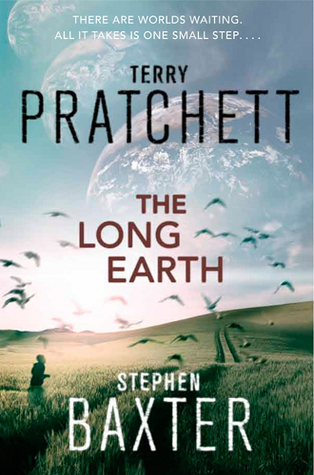Terry Pratchett is famous for his Discworld fantasy series, but he’s tried his hand at science fiction as well. His most recent effort in this vein, in collaboration with the author Stephen Baxter, is The Long Earth, which is based on an idea that predates the Discworld books and that he’s only now decided to bring to life.
The premise of The Long Earth is humanity’s invention of a device called the “stepper”, which makes it possible to travel to parallel universes. But these universes come in a fixed linear order, like cards in a deck, and you can only step through them one at a time, from the one you’re currently in to either of the ones adjacent to it.
Nor are these trips anything-goes jaunts into strange realities where magic is real or where apes evolved from men. Rather, each parallel world is recognizably Earth, but an Earth that’s permuted in various ways from our own. Those that are “next” to each other tend to be more alike, while those that are farther apart diverge more and more. This means that there are stretches of thousands of worlds which share similar characteristics: ocean Earths, glacial Earths, desert Earths, forest Earths, and so on.
The big difference is that our Earth, called the Datum, is (seemingly!) the only one that has intelligent life. Every other world in the Long Earth is a vast primeval wilderness, pristine and awaiting human settlement. Naturally, the invention of the stepper kicks off a land rush unlike anything in human history, as bands of pioneers strike out into the limitless frontier. The one wrinkle is that, for unknown reasons, nothing made of iron can be carried from one world to another. This means that in every parallel Earth that human beings settle, we have to start civilization all over again.
There are several storylines about different characters and how they adjust to the new reality, but the main protagonist is Joshua Valienté, an orphan who was raised by an unusual, unorthodox convent of nuns; he’s a natural explorer and one of the first human beings to discover the Long Earth. Joshua is recruited for an expedition by the immensely powerful Black Corporation and its secretive executive Lobsang, an artificial intelligence who claims to be the reincarnated soul of a Tibetan motorcycle repairman, in the novel’s most recognizably Pratchettesque touch. Together, Joshua and Lobsang set out on a voyage into the far reaches of the Long Earth to find what undiscovered wonders may be waiting.
If I had any complaint about the novel, it’s that it ended too soon! I feel like the plot only hinted at a much larger story that’s still lying in wait. Then again, compared to the unlimited richness and potential of this world, almost any story that could be told about it would probably seem skimpy. There’s already a sequel, The Long War, and more books in the series are coming; so there’s reason to believe that this larger story will be more fully disclosed.
P.S.: I’m on Goodreads now! If you’ve got an account, you can add me as a friend and see what I’m reading (and writing).
